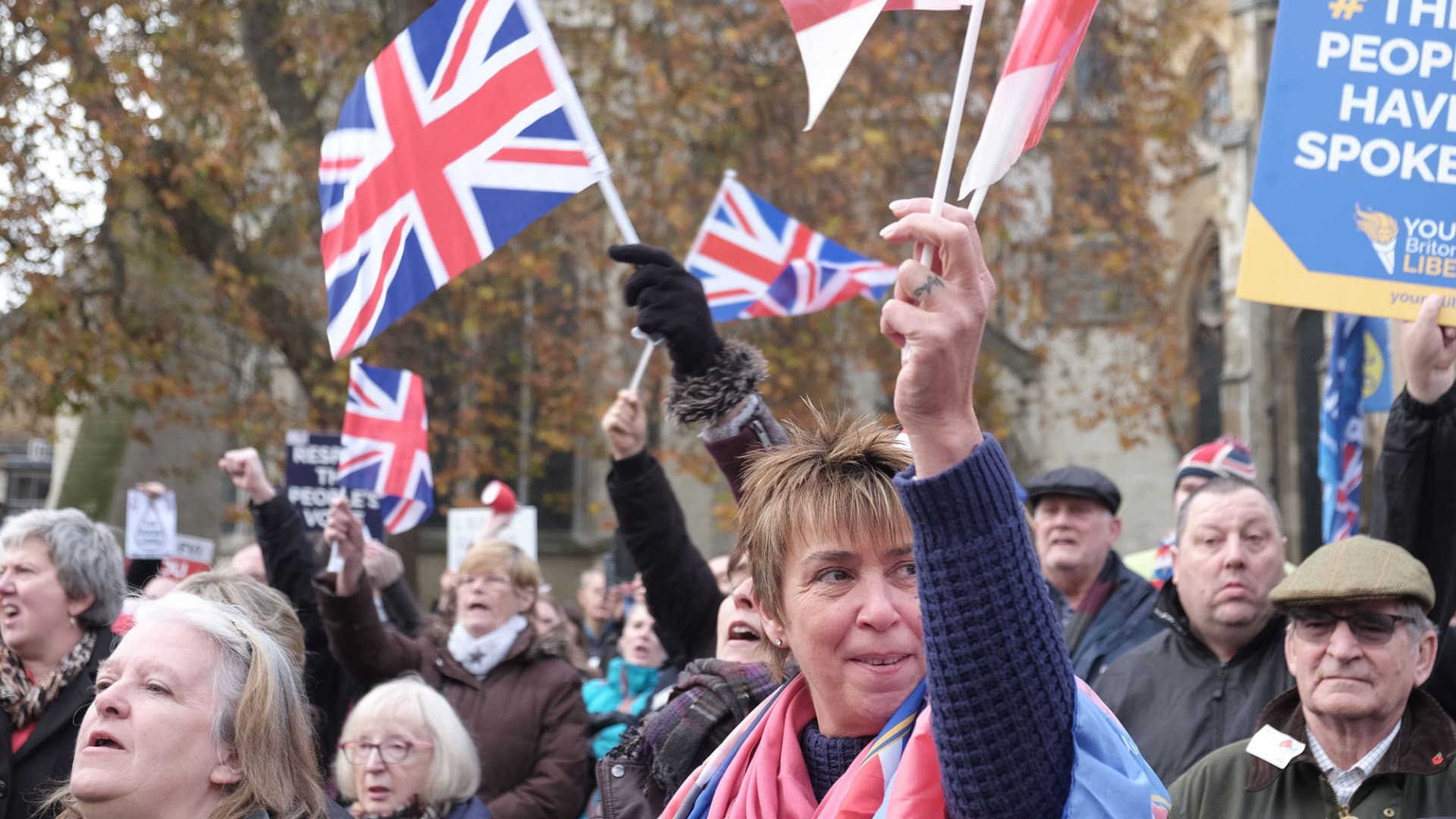
- Many EU citizens who are still living in the U.K. after Brexit have said they do not feel treated equally to U.K. citizens, according to a survey.
- A lack of uncertainty about their future status in a post-Brexit U.K. has caused 1 in 10 EU citizens living in Britain to say they are considering leaving the country after the end of June.
- EU citizens living in the U.K. must apply to remain in the U.K., if they wish to stay, by June 30.
LONDON — Many EU citizens who are still living in the U.K. after Brexit have said they do not feel treated equally to British citizens and feel worried about their rights, a new survey has found.
A lack of uncertainty about their future status in a post-Brexit U.K. has caused 1 in 10 EU citizens living in Britain to say they are considering leaving the country after the end of June. This is the deadline for EU citizens to apply to remain lawfully living and working in the U.K.
Other findings in the survey of almost 3,000 EU citizens living in the U.K., which was conducted by the Independent Monitoring Authority for the Citizens' Rights Agreements, an independent organization set up to protect the rights of EU citizens living in the U.K., found that trust in public bodies was low.
The Hurricane season is on. Our meteorologists are ready. Sign up for the NBC 6 Weather newsletter to get the latest forecast in your inbox.
One in 4 respondents in the survey said they did not believe that they are currently treated equally to U.K. citizens and nearly 1 in 2 respondents did not have confidence that they will be treated equally in future, according to the research carried out over a six-week period from February to March this year.
'Hostile environment'
Ahead of the Brexit vote in 2016, so-called "leavers" and "remainers" engaged in often vicious debate over the merits and pitfalls of EU membership.
Money Report
Critics of the Leave campaign, and resident EU citizens, felt that there was often a xenophobic undertone to some of the arguments put forward by leavers, whereas leavers felt remainers were often too negative about the U.K. and its prospects as a "sovereign" nation.
Were it not for the coronavirus pandemic, the final transition out of the bloc on Jan. 1 2021 and the effects on EU-U.K. trade and politics would likely have been bigger news. Nonetheless, Brexit has left a bitter taste in many people's mouths and still divides the U.K. down national lines — Scotland and Northern Ireland voted to remain, Wales and England to leave.

Almost one in 10 respondents also felt more unwelcome in the U.K. post-Brexit, with one saying there was a "hostile attitude from government towards immigrants" and another saying they felt there was a "hostile environment" with "people becoming more intolerant towards EU citizens."
Another summed up recent tense exchanges between the U.K. and EU since the start of the year, when a post-Brexit transition period ended, noting that "the atmosphere between the UK and the EU is hostile, I'm worried."
Interestingly, respondents most likely to leave were German, Spanish or French, older males, living in the northeast or southeast of England and those who had lived in the U.K. for five to 10 years. Those most likely to stay were Norwegian, Lithuanian, or Portuguese, younger women, living in Wales or the northeast of England and who had lived in the U.K. for less than a year.
In response to the survey, Kevin Foster, the minister for future borders and immigration, said in a statement: "EU citizens who came during free movement are our friends, neighbours and colleagues. We are committed to protecting citizens' rights and have legislated to protect those rights in the UK."
"The success of the EU Settlement Scheme, with literally millions of statuses already granted, and the steps we have taken to ensure no-one is left behind, are testament to our determination to ensure EU citizens and their family members get the status they deserve in the UK," he added.
Citizens' rights
Tensions between the EU and U.K. have been high since the shock June 2016 vote in which a narrow majority, 52%, voted to leave the bloc. Years of painstaking (and painful) negotiations ensued to disentangle the U.K. from the now-27 member economic and political union, and to create a new trading relationship.
Citizens' rights — both for EU nationals and their families in the U.K. and vice versa — were part of the Withdrawal Agreement struck between the EU and U.K. and essentially these sought to continue any residential and employment rights for each others' citizens that had been held pre-Brexit.
EU citizens in the U.K. were told they would have to apply to stay as part of the EU Settlement Scheme and, currently, EU citizens have until June 30 2021 to apply for "settled" or "pre-settled" status (the status granted depends on how long the individual has lived in the U.K.); anyone applying must usually have started living in the U.K. by the end of 2020.

Conversely, U.K. citizens in various EU countries have had to apply for new residence permits in their respective adopted countries, with varying deadlines this year.
The IMA's survey of EU citizens in the U.K. revealed concerns over future citizens' rights, however, with 30% of respondents not confident their rights will be upheld. One in 25 respondents already believed their rights have been breached. One in 10 respondents said they wouldn't complain about a breach of their rights, believing that complaining would achieve nothing.






